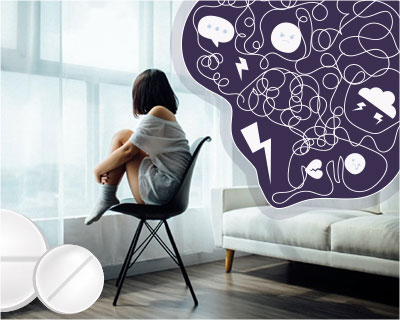What is depression?
It's normal to feel down, listless, tired and sad from time to time. If the emotions like hopelessness and despair last for a long time, it can lead to depression. Depression is more than just sadness in response to life's setbacks. It changes how you think, overly negatively colors how you feel, and can affect your ability to work, study, eat, sleep, and enjoy life.
While some people describe depression as "living in a black hole," others feel numb, empty, and apathetic. Especially the men can feel angry and restless.
No matter how hopeless you feel, improvement can occur. By identifying the causes and recognizing the different symptoms and types of depression, you can take the first steps towards feeling better and overcoming the problem.
Signs and Symptoms of Depression
Depression differs from person to person. However, there are some common signs and symptoms. It's important to remember that these symptoms can be a part of normal life. But the more symptoms you have, the more severe they are, and the longer they last, the more likely you are to deal with depression.
10 common symptoms of depression
- Feelings of helplessness and hopelessness . Nothing can ever get better and there is nothing you can do to improve your situation.
- Loss of interest in daily activities . You are no longer interested in your hobbies, pastimes, social activities, or sex. You have lost your ability to feel joy and pleasure.
- Changes in appetite or weight . A significant weight loss or weight gain to 5 percent of body weight per month.
- Sleep changes . Either insomnia, especially early in the morning, or too much sleep.
- Anger or irritability . Tension, restlessness or even aggression. Your tolerance limit is low. You are hot-tempered and everything and everyone gets on your nerves.
- Fatigue and lack of drive .
- Reduced self-esteem . Strong feelings of worthlessness or guilt. They criticize themselves harshly for perceived flaws.
- Inconsiderate Behavior . They abuse drugs, gamble, or engage in dangerous extreme sports.
- Difficulty concentrating . You have trouble concentrating, making decisions, or remembering things.
- Inexplicable pain . You experience physical complaints such as headaches, back pain, muscle pain and abdominal pain.
How do depression symptoms differ by gender and age?
Depression often varies by age and gender, with symptoms differing between men and women, or adolescents and older people.
Depression symptoms in men
Men who suffer from depression are less likely to acknowledge feelings of self-loathing and hopelessness. Instead, they complain of fatigue, irritability, trouble sleeping, and loss of interest in work and hobbies. They are also more likely to experience the symptoms of anger, aggression, reckless behavior, and substance abuse.
Depression symptoms in women
Symptoms such as excessive feelings of guilt, too much sleep, overeating and weight gain are more common in women. The depression in women is also influenced by hormonal factors during menstruation, pregnancy and menopause. Every 7th woman develops postpartum depression after childbirth.
Depression Symptoms in Teenagers
The irritability, anger and restlessness are the most common symptoms of depression in teenagers. They may also complain of headaches, stomachaches, or other physical pains.
Depression Symptoms in the Elderly
Older people are more likely to complain about the physical signs and symptoms of depression (fatigue, unexplained pain, and memory problems) than the emotional signs. They can also neglect their personal appearance and stop taking important medications for their health.
What types of depression are there?
There are different types of depression. Symptoms vary from mild to severe. It is therefore important to recognize the symptoms and get the most effective treatment.
Mild and moderate depression
These are the most common types of depression. The symptoms of even mild depression can interfere with your daily life, robbing you of joy and motivation. These symptoms are exacerbated in moderate depression and can lead to reduced self-esteem.
Chronic depressed mood (dysthymia)
Dysthymia manifests itself in the form of a chronic depressive mood. Symptoms of dysthymia are not as severe as major depressive symptoms, but they last for a long time (at least two years). Some people also have major depressive episodes. If you have dysthymia, you may feel like you have always been depressed.
Unipolar Depression (Major Depression)
Major depression is much less common than mild or moderate depression and is characterized by severe symptoms. Without appropriate treatment, major depressive symptoms can last up to 6 months. Some people experience only one depressive episode in their lifetime. However, there is a risk of relapse.
Winter Depression (Seasonal Depression)
Some people experience winter depression, known as seasonal affective disorder (SAD), during the dark months of fall and winter. About 1 to 2 percent of the population suffers from SAD, especially women and young people. Seasonal depression can leave you feeling like a completely different person than you did in the summer, feeling hopeless, sad, tense, or stressed, with no interest in friends or activities. Symptoms usually last into the lighter spring days.
What can cause depression?
While some medical conditions have a specific medical cause that makes them easier to treat, depression is much more complicated. Certain medications, such as barbiturates, corticosteroids, benzodiazepines, opioid pain relievers, and certain blood pressure-lowering drugs can trigger symptoms in some people — as can hypothyroidism. Most commonly, however, depression is caused by a combination of biological, psychological, and social factors that can vary widely from person to person.
Depression isn't just the result of a chemical imbalance in the brain that can be easily cured with medication. Biological factors can certainly play a role in depression, including inflammation, hormonal changes, suppressed immune system, malnutrition, etc. Depression can also be caused by psychological and social factors, such as past trauma, substance abuse, loneliness, low self-esteem, and lifestyle.
Risk factors of depression
Risk factors for depression include loneliness and isolation, family or relationship problems, traumatic life experiences, chronic illness or pain, a history of depression, childhood trauma, alcohol or drug abuse.
What can you do about depression?
There are many ways to lift and stabilize your mood. The key is to start with a few small goals and slowly build up from there, trying to achieve a little bit more each day. It takes time to feel better, but you can get there by making positive choices for yourself.
- Spend more time with other people. Isolation and depression are closely related, so you should spend more time with your friends and family. A simple conversation about how you are feeling can go a long way.
- Move more. Regular exercise can be just as effective as antidepressants in getting rid of the symptoms of depression.
- Reduce consumption of foods that can affect your mood, such as caffeine, alcohol, trans fats, sugar, and refined carbohydrates. Eat more healthy mood enhancers, such as omega-3 fatty acids.
- Find yourself again. Spend time in nature, take care of a pet, find your hobby.
When do you need professional help?
When support from family and friends and positive lifestyle changes aren't enough, consult a mental health professional. There are many effective treatment options including psychotherapeutic treatment, drug treatment, relaxation techniques and yoga, light therapy, electroconvulsive therapy, etc.
Antidepressant medications are primarily used in cases of severe and frequently recurring depression.
From the category: Where, how and what drugs to buy?
Last updated on 02.06.2022







